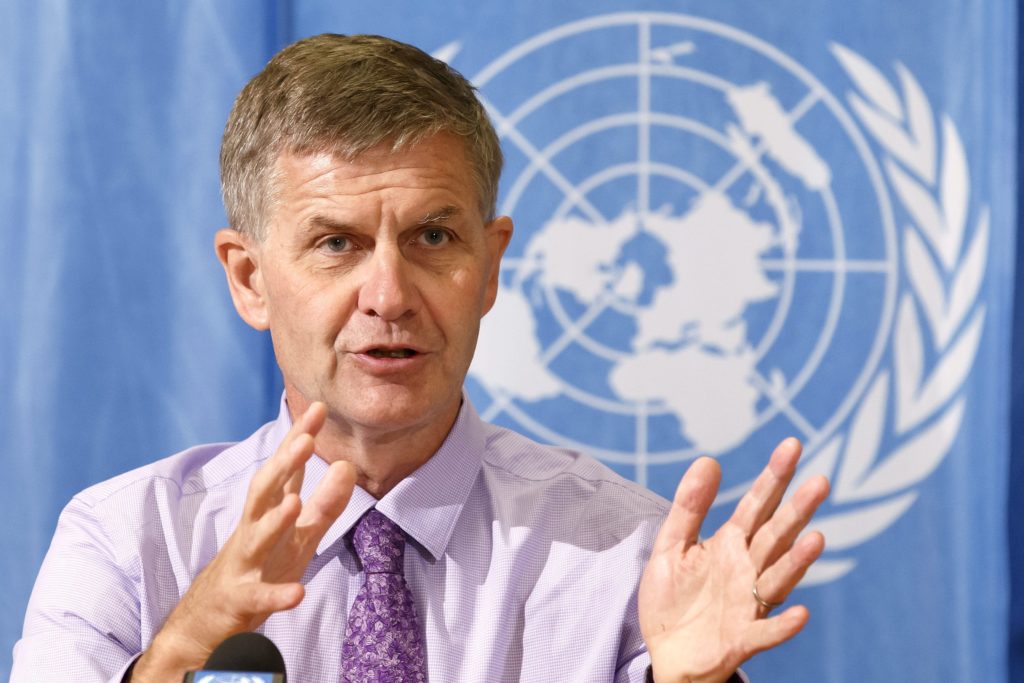The stunning electoral sweep of the National People’s Power (NPP) led by President Anura Kumara Dissanayake is “an earthquake in Sri Lankan politics”, says Erik Solheim, the former Norwegian peace facilitator in the island nation.
The former diplomat also feels that the strong showing by the NPP in areas populated by Tamils, particularly in the north, marked “a very strong call for a new start in ethnic relations in Sri Lanka”.
Solheim, who has interacted closely with many Sri Lankan leaders, however, warned that while the NPP’s inner core “is for sure non-corrupt, eradicating corruption is a huge task”.
‘Voters angry over corruption’
Solheim, now a committed green activist, piloted the Western-backed peace process which led to a historic pact between Colombo and the Liberation Tigers of Tamil Eelam (LTTE) in early 2002.
But the process collapsed, triggering a renewed war four years later that led to the decimation in 2009 of the LTTE and the annihilation of virtually its entire leadership including founder-leader Velupillai Prabhakaran.
A former leader of the Socialist Left Party in Norway, Solheim remains a keen follower of developments in Sri Lanka, where he once came under attack from sections of the majority Sinhalese community for allegedly being pro-LTTE, a charge he has repeatedly denied.
In an email interview with The Federal from China which he frequently visits, Solheim said he did expect the NPP “to be very successful” in the November 14 elections but “their sweeping victory was even bigger than I (expected)”.
He added: “It is an earthquake in Sri Lankan politics. For the first time, Sri Lankans elected a president and a party from outside the Colombo establishment, the son of a labourer in Anuradhapura.”
He said the voters, particularly the less privileged, were angry over corruption, felt that the traditional elite had not represented them well, and were upset they had to cut meals following the economic collapse of 2022.
Solheim said that while individually many traditional Sri Lankan leaders were very nice, “as a class they have failed Sri Lanka and made the nation underperform compared to say Singapore, Vietnam, Malaysia or Tamil Nadu”.
Is Tamil voting for NPP a rejection of Tamil nationalist politics?
For this, he blamed narrow ethnic appeals that led to a prolonged war – “and no country marches forward in the midst of a civil war”. There was also little ability to formulate a winning economic policy for growth and poverty alleviation.
Solheim said the unexpected scale of electoral support to the NPP – a party otherwise rooted in Sinhalese regions – in Tamil areas was “an astonishing vote of confidence from many Tamils” in the Left-of-Centre party. “I believe it represents a strong desire for peace and normalcy in the north and east. It also comes from a trust that the current NPP is not the same as the JVP (Janatha Vimukti Peramuna, People’s Liberation Front) of the past.”
The NPP, whose core strength comes from the leftist JVP, won a whopping 159 seats in the 225-seat parliament, decimating a divided Opposition. It also picked up seats in the Tamil-majority north and the multi-racial eastern province.
Asked if the Tamil voting for the NPP was a rejection of the Tamil nationalist politics, Solheim said: “It is a very strong call for a new start in ethnic relations. If the NPP is able to deliver for Tamils and keep their support, it represents a historic shift.”
The NPP victory in Tamil areas is considered significant as the JVP, the party’s dominant constituent, opposed devolution of power to the Tamil region, stood for a unitary state, and got the once united north-eastern province de-merged into two – all to the chagrin of traditional Tamil politicians.
The Norwegian, a former Undersecretary General in the United Nations (UN), said the new government’s priority would be to negotiate a better deal with the International Monetary Fund (IMF) and to formulate a winning strategy for economic growth with a fairer deal for the poor.
‘Left-wing parties with old-fashioned ideas don’t win elections’
Solheim added that the NPP’s performance – it also won the presidency in September – showed that the Left can win elections if they put Left-wing sectarianism aside and come up with a policy with a broad mass appeal.
“(Dissanayake) embodied this with his inclusive approach. Left-wing parties with old-fashioned ideas don’t win elections,” he said, pointing to the electoral rout of the once powerful Communist Party of India (Marxist) in West Bengal.
“If AKD (Dissanayake) like (President) Lula (da Silva) of Brazil introduces policies for the poor while at the same time working closely with business, the NPP can stay in power for long. It’s too early to tell whether we have experienced a new epoch in Sri Lankan politics or just a change of government for five years. This is the chance for the NPP to establish themselves as a long-term ruling entity with the capacity for a big shift in Sri Lanka,” he said.
Solheim, who often met LTTE leaders including Prabhakaran, reiterated his view that a peace deal could have been found in Sri Lanka in 2002-04. “Unfortunately, we didn’t succeed… The result was the loss of tens of thousands of lives, mainly Tamils but also many Sinhalese. The war of course also brought huge economic hardship to all communities. Sri Lanka was once the shining star in Asia which nearly every other nation wanted to emulate. Now Sri Lanka needs sustained green economic growth for a number of years to catch up with many neighbours.”
Does he, as a Sri Lanka watcher, have a message for President Dissanayake?
“My advice is to focus on economic and ethnic inclusivity. Uplifting the poor is important for all ethnic groups. Added, AKD should respond favourably to the call from Tamils and Muslims for equal rights and self-government,” he said.
Source: The Federal


